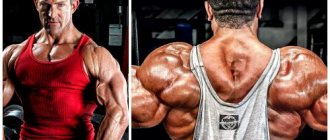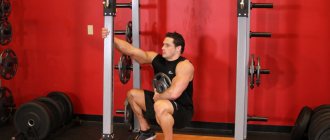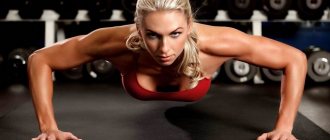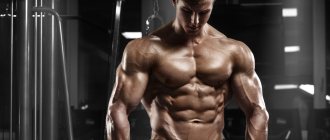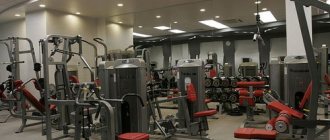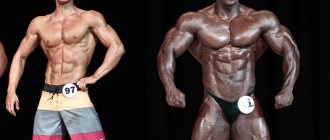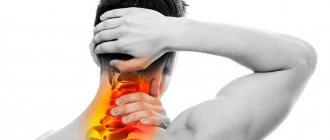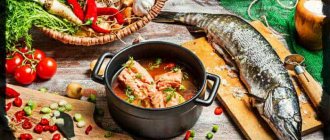It is believed that sport and meat are inseparable things. Meat is the main source of protein for an athlete; it makes him strong and resilient, and helps build muscle. Can a vegetarian achieve any significant results in sports, much less in bodybuilding or any strength sport? Many meat eaters will answer unequivocally - no! The portrait of a vegetarian in their view is quite clearly and clearly represented by a thin man with a haggard face from starvation and flabby skin. However, don't rush to conclusions. You will be surprised if I tell you that among famous athletes around the world there are a lot of vegetarians and even vegans, for example, Carl Lewis (vegan track and field athlete), Salim Stoudemire (vegan basketball player), Robert Parish (vegetarian basketball player), Mike Tyson ( boxer - vegan) and many other athletes who at one time not only competed, but set records that for a long time all other athletes could not break. I will surprise you even more if I say that the idol of the famous Arnold Schwarzenegger, Bill Pearl (a bodybuilding legend who received the title “Mr. Universe” four times) was a vegetarian.
Protein
Vegetarianism and sports
Today, more and more people are leaning towards non-traditional food systems. One such system is vegetarianism. Although vegetarians themselves would argue about tradition here. For some, refusing to eat animal food is a philosophy of life, for others they do not eat meat for religious reasons, for others it is possible that they have digestive problems, for others it is due to some of their beliefs. For what reasons do these people refuse meat products is a personal matter for everyone. But in this article, let's try to understand how refusing to eat animal products affects exercise, whether it is possible to combine it, and what needs to be paid more attention to.
I’ll say right away: yes, it’s possible. Moreover, there are many famous vegetarian athletes, and their sporting achievements confirm that giving up meat, fish, and milk does not close the door to big-time sports.
Influence on sports performance[edit | edit code]
Modern literature does not contain much reliable data on the effect of a vegetarian diet on athletic performance.
In 1970, Cots and colleagues conducted a study of 14 women who had not eaten animal products for an average of 11 years.
Scientists compared a group of vegetarians with two control groups. One of them included 66 women of a similar social background and the other included 20 women (office cleaners by profession) who had a similar daily activity level to the subjects.
All subjects performed a test on a bicycle ergometer lasting 3 minutes, with power set at 30 and 60 Watts (submaximal test). At the same time, breathing parameters and heart rate were measured. In addition, the subjects' thigh muscle girth was measured. Control groups averaged higher heart rates at lower activity levels (P>0.02). However, there were no significant differences recorded between the vegetarian group and the control groups in such a parameter as thigh muscle girth. Overall, the authors refuted the hypothesis that low levels of animal protein in the diet influence the physiological response to submaximal muscle loads.
To date, there is still little reliable evidence to support or refute the benefits of a vegetarian diet for certain groups of athletes. However, sources are replete with various unverified information.
For example, members of the Tarahumara Indian tribe, living in the state of Chihuahua in northwestern Mexico, are reported to have extreme endurance and are very strong long-distance runners[1]. It is known that they adhere to a generally vegetarian diet and their diet practically does not include animal components. It is reported that members of this tribe regularly participate in traditional races of up to 320 km, which sometimes last for several days.[2]
Cerqueira et al (1979) studied the diet of the Tarahumara and found that the majority of their daily energy intake came from grains, legumes, and squash.
About 94% of tribal members' daily protein intake comes from plant sources, and only 6% comes from animal sources. At the same time, fats make up about 9-12% of their diet, and since they are mainly of plant origin, we can say that the food of the Tarahumara tribe is rich in linoleic acid and phytosterols. Tarahumara food is also extremely low in cholesterol (about 71 mg/day). The main source of cholesterol in their body is bird eggs, which they consume no more than 2-3 per week. Other sources of cholesterol and animal fats—meat, fish, dairy products, lard—are poorly represented in the tribe’s diet. The use of these products is sporadic.
Despite the fact that the Tarahumara diet consists mainly of plant foods and is simple in content, it can be called quite balanced. Members of the tribe do not have chronic deficiencies of any significant nutritional elements[3].
Hanne et al (1986) examined various athletic performance indicators in vegetarian athletes and compared them with those of meat-eating athletes. The experiment involved 49 athletes (29 men and 20 women) who adhered to a lacto-vegetarian diet for at least 2 years. The control group also consisted of 49 people (29 men and 20 women).
Participants ranged in age from 17 to 60 years, with the majority in the 17-35 age range. Parameters measured in the study included anthropometric data, pulmonary function, aerobic and anaerobic power, and blood chemistry. The authors did not note any significant differences between the groups in terms of body weight. However, vegetarian women had significantly (P>0.01) higher total body fat content compared to the control group.
However, no differences were noted in lung function, heart rate, blood pressure, or electrocardiogram. No differences were also found in the developed aerobic and anaerobic power (in the submaximal test and the Wingate test). Biochemistry results showed that uric acid levels in the blood of control group participants were lower than those of vegetarian participants.
Vegetarian women had a lower hematocrit than women in the control group. At the same time, the levels of hemoglobin, total protein and glucose were similar.
So, no significant differences in the studied parameters were found between the control groups. It should be taken into account that in addition to the diet itself, lifestyle, the level of daily physical activity and many other factors that can affect the purity of the study have a great influence.
This is where the problem becomes apparent: when studying the effects of a vegetarian diet on athletic performance, the authors do not pay enough attention to the specific type of diet that the subjects are following. Many athletes may call themselves vegetarians, but in fact they only exclude a certain group of foods from their diet. More detailed information about the diet of vegetarian athletes could shed more light on the negative and positive aspects of this type of diet.
Stages of transition to vegetarianism
If you decide not to eat animal food, then the transition to such a diet should not occur abruptly, but gradually, since any sudden change in the nutritional system is a stressful situation for the body. There are several stages of transition, each of them is also a type of vegetarianism.
1. Exclusion from the diet of red meat. This is the very first and mildest case, since in this case the body still has the opportunity to receive a complete set of proteins, fats, carbohydrates, vitamins, microelements, etc. Adherents of this nutrition option have no problems with gaining weight or building muscles.
2. Refusal of the bird. It’s a little more complicated here, but still, when consuming dairy products, eggs, and fish, we still have the opportunity to get complete protein foods.
3. Exclusion of fish and seafood from the diet. Seafood contains, in particular, a large amount of zinc, which is easily absorbed by the body when consumed. If you exclude their intake, then you need to think about how to compensate for the lack of this microelement. During sports activities, zinc also tends to be excreted from the body. In this situation, various food supplements with microelements will come to the rescue.
4. Elimination of eggs. As you know, the egg is digested almost 100%. This means that the amino acids, microelements, and vitamins contained in it are completely absorbed in the body. It is necessary to carefully select a balanced diet to replenish nutrients.
5. Refusal of dairy products.
All these stages must take place sequentially and over a long period of time. It's better if you stay on each of them for a year, maybe two, maybe more. Try to first listen to your body, understand your condition; perhaps going further to veganism does not make sense and you need to stop at one of the intermediate stages. Moving on to each next stage, you need to think through your diet. Most likely you will have to add products that are new to you that you have not eaten before. Additionally, take vitamin and multimineral complexes and nutritional supplements.
Protein for vegetarians
Finding the right dietary supplements for vegetarians is much easier. You can get important essential amino acids from dairy products and their derivatives - cottage cheese, sour cream and others. To do this, use protein shakes or dry powder concentrates. For example, there is whey, egg protein or casein.
Whey
It is considered the best protein supplement option for vegetarians, as the speed and quality of its absorption are quite high. It is made from whey and includes a BCAA complex (amino acids - valine, leucine and isoleucine, which are considered essential). Use it after exercise.
It is produced in the form of concentrate and isolate. Concentrate is liquid whey isolated from milk that has been dried to a powder form. Isolate is whey from which lactose, fats and cholesterol have been filtered.
Egg
This type belongs to protein powders, the main component is chicken egg white. The composition contains all the amino acids necessary for the body. Vegan egg protein is the best solution for those who are intolerant to lactose and soy products. Can be consumed before and after sports.
Casein
They use it between workouts due to its slow absorption rate - about six hours. This product is obtained by converting milk into cottage cheese using enzymes.
What substance deficiencies may occur when switching to vegetarianism?
The biggest mistake when switching to a vegetarian diet is to continue to eat the same foods with the exception of meat foods. If you refuse to eat food of animal origin, you may experience a deficiency of not only amino acids, but also vitamin B12, vitamin D, Omega3 fatty acids, calcium, and magnesium. Their deficiency threatens a decrease in immunity and the development of various inflammatory reactions. We need fiber to properly digest food. With a vegetarian diet, a very large amount of fiber enters the body, but at the same time it not only stimulates digestion, but also absorbs some of the essential amino acids.
Chia seeds
Chia seeds are tiny, round seeds that are often black or white.
They are unique in that they can absorb liquid and form gel-like substances. As a result, they can be used to make pectin-free puddings and jams. They are also widely used as an egg substitute in vegan baking.
However, chia seeds can also be used raw as an ingredient in oatmeal or salads, or added to baked goods or smoothies.
Two tablespoons (30 grams) of chia seeds contain 4 grams of protein. They are also a good source of omega-3s, iron, calcium, magnesium and selenium (,).
Summary:
Chia seeds are tiny, round seeds that contain all nine essential amino acids. Two tablespoons (30 grams) contain 4 grams of protein, as well as good amounts of omega-3 fatty acids and several important minerals.
Protein for Vegans
Vegans and vegetarians need protein just as much as any other athlete, and even more. Imagine that even athletes who are not vegetarians are often forced to compensate for the lack of protein with protein sports supplements. But what about vegans? Protein in sports is required to build muscle tissue. Muscles are strength. This means that without protein there will not only be a beautiful appearance, but also outstanding strength indicators. But that’s not so bad, oddly enough. It is even more important that protein is required not only for muscles - it is needed for tendons, joints, blood vessels and skin, because their structural basis is made up of proteins such as collagen and elastin, which are found in sufficient quantities for a physically active person only in animal food. And protein, or more precisely the essential amino acids it contains, is required for the normal functioning of the nervous system and blood renewal. With a lack of complete protein in food, muscle weakness, lethargy occurs, muscle mass and strength decrease, metabolism slows down, irritability appears, the skin becomes flabby, and joints begin to ache.
Where can you find vegan protein? Let's look at what foods contain protein and whether it is enough for an active life.
In confirmation of words
Many professional athletes who have achieved success in their field and become famous declare their vegetarian preferences. Moreover, even those athletes who engage in heavy sports that require enormous physical exertion, strength, and endurance. For example, the famous boxer Mike Tyson is a vegetarian. Here is another list of famous vegetarian athletes: Bruce Lee - the king of martial arts, Carl Lewis - athlete, Prince Fielder - baseball player, Chris Campbell - wrestling, David Zabriskie - bicycle, Bill Pearl - bodybuilding. And this is not the entire list. Want to join him?
Sources of protein for vegetarians
How do vegetarians get protein? To compensate for the lack of protein, athletes have to consume large amounts of protein of plant origin, which is absorbed by the body worse than animal protein. Plant protein is found in nuts, legumes, mushrooms, soy, and cereals.
The fact is that plant proteins
a) deficient in amino acid composition - they contain less essential amino acids,
b) contain substances that slow down the absorption of protein - for example, protease inhibitors (an enzyme that breaks down protein).
How can vegetarian athletes avoid protein deficiency? If you have completely excluded foods of animal origin, then you can get the necessary amino acids by eating a combination of cereals and legumes. An even better result is possible if you add nuts here. The best protein foods for vegetarians are soybeans and other legumes (beans, peas, lentils), grains (quinoa, buckwheat, oatmeal, pearl barley), nuts and seeds (peanuts, sunflower seeds, chia seeds, etc.).
Another important component for athletes, which is found in products of animal origin and is practically absent in plant foods, is creatine. It is necessary for gaining muscle mass, for recovery after training, and for increasing endurance. Creatine participates in the body's metabolic processes, strengthens joints and tendons, and improves the functioning of the cardiovascular system. To restore creatine requirements, vegetarians need to take dietary supplements.
What to do with vitamin B12 deficiency? The problem is that this vitamin is found almost exclusively in animal products. We need vitamin B12 for the normal healthy functioning of the nervous system and brain; even a slight deficiency of it leads to cognitive impairment, chronic fatigue, and possibly numbness of the limbs. If it is possible for you to consume eggs, cheese or milk, there is no particular danger. If you adhere to strict vegetarianism, you need to add vitamin supplements to your food.
To avoid a lack of iron, which red meat is rich in, you need to add more spinach and legumes to your diet. Iron is involved in the processes of hematopoiesis, collagen synthesis, and is necessary for transporting oxygen to organs and tissues.
Zinc. The main source of zinc for meat eaters is meat, seafood, and dairy products. We need zinc for the synthesis and breakdown of proteins, carbohydrates, fats, and we need it to produce insulin, which regulates blood sugar levels. Zinc is also important for reproductive function, the immune system, it has antiviral and antitoxic properties. A lack of zinc will manifest itself in deterioration of the condition of the skin, hair, and nails. Plant sources of zinc are pine nuts, pumpkin seeds, legumes, wheat germ, peanuts. When playing sports, the need for zinc increases.
If you stop eating dairy products, there is a high chance of calcium deficiency. In addition, with increased fiber intake, its absorption decreases. As we all know, calcium is the key to healthy teeth and strong bones. With age and during sports activities, the need for it increases. Plant sources of calcium - nuts, legumes, bean curd, sesame seeds, dark green leafy vegetables - broccoli, spinach.
Omega-3 fatty acids. Plant sources include seeds, nuts, and wheat germ. Omega-3 is necessary for our skin, joints, brain, and heart.
Pita and hummus
Pita and hummus is another combination that contains all nine essential amino acids.
Like rice, the wheat used to make pita bread contains too little lysine to be considered a complete source of protein. However, chickpeas, the main ingredient in hummus, are rich in lysine (,).
One medium whole wheat pita (60 grams) with 2 tablespoons (30 grams) of hummus contains approximately 7 grams of protein (,).
In addition to serving as a snack, adding fried or baked chickpea balls known as falafel will further boost the protein content of pita and hummus.
Summary:
The combination of pita bread and hummus is another classic combination that provides a complete source of protein. One medium pita (60 grams) with 2 tablespoons (30 grams) of hummus provides 7 grams of protein.
What you need to know when creating a diet for a vegetarian athlete
It is important to consider that when trying to fill the lack of protein with plant foods, grains and nuts, you can easily go overboard in terms of calories. Cereals contain a very large amount of carbohydrates - several times more than protein, and nuts contain up to 50% fat. A good solution may be to use sports protein and amino acid supplements - soy and pea protein, as well as BCAA and collagen, can be found on sale.
Complex carbohydrates must be present in the diet of a vegetarian athlete. They are necessary to replenish glycogen reserves - the energy necessary for training and their effectiveness. With a lack of glycogen, severe fatigue occurs. Complex carbohydrates are porridge (oatmeal, rice, buckwheat), potatoes, pasta, legumes. Such foods with slow carbohydrates should make up at least 30-40% of the diet. And in order for carbohydrates to be used, physical activity is required, otherwise problems with unwanted weight gain and all sorts of associated diseases will begin.
More vegetables and fruits! They should be present in both main courses and snacks.
Also, when drawing up a nutrition plan, it is necessary to take into account all possible deficiencies of minerals, amino acids, and vitamins. And accordingly, stock up on the necessary nutritional supplements that can replenish your body with valuable nutrients.
Women who give up eating animal foods need to pay great attention to meeting their calcium needs. Research shows that a lack of calcium contributes to a decrease in bone mineral density, which in turn may be one of the factors leading to disturbances in the stability of the menstrual cycle.
Summarize
- Although there are some concerns about getting enough protein on a vegetarian or vegan diet, there are many plant-based foods that are high in protein.
- In addition, some of these foods even contain all nine essential amino acids and are therefore considered complete proteins.
- To make sure you're meeting your amino acid needs on a vegetarian or vegan diet, try incorporating different combinations of these protein sources into your diet.
Tags: Vegan diet, Vegetarianism
- Related Posts
- The healthiest fats: food list
- Should you drink 3 liters of water a day?
- How many bananas can you eat a day?
« Previous entry
Products that should be present in the diet
There are some foods that you want to keep in your diet no matter what stage of vegetarianism you decide to enter. They are, of course, useful not only for vegetarians, but also for all athletes.
Bananas. This is a great nutrient-packed snack that will quickly restore strength and energy after a workout.- Dried fruits. They contain a lot of vitamins and microelements. This is an excellent source of glucose and carbohydrates, which carry an excellent charge of energy and potential. They can be consumed even during training.
- Green tea. Drinking tea has a stimulating effect on the central nervous system, thereby increasing physical and mental performance and endurance. Gives blood vessels strength and elasticity, reduces the risk of muscle injury during training.
- Tomatoes. Tomatoes are a valuable source of lycopene, which has not only antioxidant properties, but also anti-inflammatory ones. They contribute to faster recovery after training, especially if the muscles were injured during it. Lycopene is absorbed better after heat treatment of tomatoes.
- Superfoods. These are products rich in nutrients, vitamins, minerals, and proteins. These include goji berries, acai, chia seeds, raw cashews, quinoa, black rice, avocado, sesame seeds.
It is very important to constantly monitor your condition. If you notice that you are in a state of constant fatigue, irritability, your strength indicators are decreasing, your endurance is decreasing, you need to adjust your diet, perhaps adding some foods or supplements. Do periodic tests to detect a decrease in vital signs in time, consult with nutritionists to create a complete diet. The main thing is your excellent health, cheerful mood and self-confidence. Good sporting success to you!
How to take plant-based protein
Depending on the purpose set before starting to use protein supplements, the methods of their use are also distinguished. So, for example, for gaining weight or for losing weight, the method of taking the product is different. In particular, the application option depends on the manufacturer - some are used only at certain times of the day, during meals, before or after meals, before/after or during training.
For weight gain
To gain weight, the percentage of protein must be at least 80% per 100 g of product. Such proteins are soy and others.
Can be used up to 4 times a day:
- Half an hour after breakfast.
- Half an hour after lunch.
- After physical activity or instead of dinner.
- Before bedtime.
The serving volume is calculated individually.
For weight loss
First of all, the daily requirement for proteins, fats and carbohydrates is calculated. Then a protein with minimal fat and carbohydrate content is selected. Used in two approaches: in the morning and after physical activity until four hours after lunch.
Protein of plant origin is practically in no way inferior to animal protein. It is important to calculate the correct daily intake and type of supplement, depending on the purpose of its use. It is a mistake to believe that protein supplements are only needed by athletes. If a person has chosen vegetarianism or veganism, then one should remember the importance of maintaining a balance of protein levels in the body. For this purpose, various protein mixtures of plant origin are used. With a sedentary lifestyle, the daily norm will be much lower than with active physical exercise, since in the latter case many times more energy is spent.
Protein for a vegetarian: where to get it
But no matter what type a vegetarian considers himself to be, he cannot do without protein, which, as you know, is found not only in meat (by the way, there is not very much of it) and fish, but also in such products as:
- legumes;
- seeds and nuts;
- mushrooms;
- dried fruits;
- cereals;
- cereals;
- seaweed;
- vegetables;
- berries and fruits.
If a vegetarian does not adhere to strict food limits, then he can find protein in milk, cheese, butter, eggs, fermented milk products, and yogurt.
Vegetarian recipes for every day for weight loss
Plant foods are good for the body, for some it is the basis of life, for others it is fasting days to cleanse the body. It is important to note that there are several levels of vegetarianism:
- Classic - you can’t eat meat, poultry and fish.
- Strict - do not eat all animal products, even honey.
There remains a considerable list of products at your disposal from which you can prepare various vegetarian dishes, which gain particular popularity during religious fasting. Vegetarian porridges can be prepared every day, without any special skills or recipes; when prepared skillfully, baking does not differ from traditional ones. Using only plant products, you can even prepare lean sausage or frankfurters, rolls or sushi, pancakes, salads, cakes, dumplings and other first and second courses. To replace meat in your diet, you can use soy, chickpeas, lentils, beans, and peas.
Vegetarian borscht
- Time: 90 minutes.
- Number of servings: 10 persons.
- Calorie content of the dish: 23 kcal per 100 g.
- Purpose: for lunch, for dinner.
- Cuisine: vegetarian.
- Difficulty: medium.
Classic vegetarian borscht is prepared not with meat, but with vegetable broth. If desired, you can add white or red beans to it, but in this case the calorie content of the dish will be slightly higher. The secret of a lean dish is to fry your favorite spices in a dry frying pan, then they will reveal their aroma 100%. By preparing borscht according to the recipe with the photo, adhering to all the recommendations, you will get a dish that is indistinguishable from meat borscht. The ratio of BJU per 100 g of finished dish is 0.7/0.8/3.3.
Ingredients:
- red beets – 450 g;
- carrots – 120 g;
- white cabbage – 700 g;
- potatoes – 200 g;
- onion – 100 g;
- tomato paste – 25 g;
- greens – 20 g;
- vegetable oil – 35 ml;
- bay leaf – 1 pc.;
- salt – 5 g;
- black pepper, coriander, cumin, paprika - to taste;
- water – 3 l.
Cooking method:
- Peel the potatoes, cut into large strips.
- Place in a saucepan, add water and put on fire.
- Peel and wash the vegetables. Grate the beets and carrots on a coarse grater. Chop the onion.
- Fry the spices in vegetable oil, then add tomato paste.
- After a few minutes, add chopped vegetables and fry for 10 minutes.
- Pour over half-cooked potatoes.
- Add shredded cabbage there. Cook until the vegetables are ready.
- Add salt to taste. When serving, garnish with herbs and lean mayonnaise.
Cutlets
- Time: 30 minutes.
- Number of servings: 4 persons.
- Calorie content of the dish: 230 kcal per 100 g.
- Purpose: for lunch, for dinner.
- Cuisine: vegetarian.
- Difficulty: medium.
There are many recipes for making lean cutlets. They are very easy and quick to prepare. As a binding component, you can use starch, soy or chickpea flour diluted in water, or soaked yeast bread. BJU ratio – 16.3/7.6/36.7. The main ingredients can be:
- mushrooms;
- vegetables - cauliflower and white cabbage, potatoes, carrots, pumpkin;
- cereals – semolina, buckwheat, rice, corn, pearl barley, bulgur;
- legumes - peas, beans, lentils, chickpeas;
- nut;
- tofu.
Ingredients:
- red lentils – 250 g;
- sprouted wheat grains – 100 g;
- potato starch - 2 tbsp. l.;
- breadcrumbs – 30 g;
- vegetable oil for frying;
- salt, spices - to taste.
Cooking method:
- Soak the lentils in water for 2 hours.
- Grind the wheat and lentils in a blender or meat grinder.
- Add starch and spices.
- Form cutlets, roll them in breadcrumbs.
- Fry in vegetable oil on both sides for 3-5 minutes.
Vegetarian sausage
- Time: 60 minutes.
- Number of servings: 6 persons.
- Calorie content of the dish: 270 kcal per 100 g.
- Purpose: for lunch, dinner, snack.
- Cuisine: vegetarian.
- Difficulty: medium.
It doesn't take much time to make homemade vegetarian sausage. As in the case of cutlets, meat can be replaced with completely opposite products. For lean sausage, peas, beans, wheat, semolina or soy are used, which must first be boiled . To give the “sausage” shape, use cling film. The ratio of BJU in the finished product is 9.7/24.4/3.9. This unusual recipe uses sunflower seeds, agar-agar and spices. It can be prepared for fasting people, vegetarians, diabetics and those losing weight.
Ingredients:
- seeds – 270 g;
- water – 1 tbsp.;
- agar-agar – 1 tsp;
- garlic – 1 tooth;
- beet juice – 20 ml;
- spices - to taste;
- salt - to taste.
Cooking method:
- Soak the agar-agar in water for 60 minutes.
- Pre-soak the seeds for 6 hours.
- Mix all ingredients except agar-agar. Add spices and salt.
- Grind with a blender.
- Bring agar-agar to a boil. Add to mixture.
- Place the sausage mixture in a mold or wrap in cling film.
- Place in the refrigerator until hardened.
